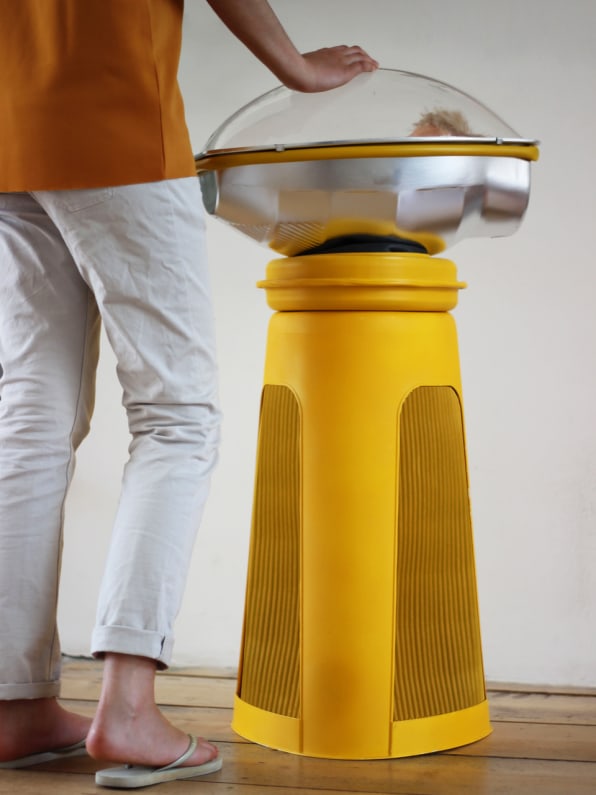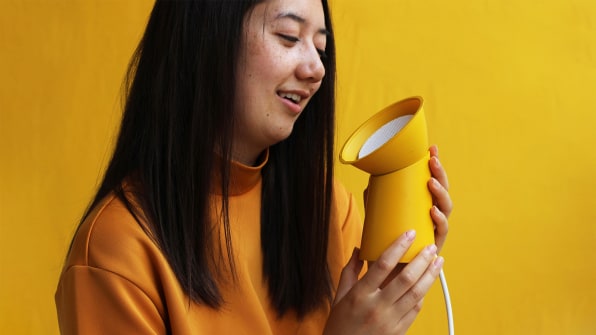What Side of the Stomach Does a Baby Grow
When People magazine revealed last week that Kim Kardashian and Kanye West had hired a surrogate to carry their third child, it dominated headlines but shocked almost no one. After all, surrogacy is on the rise in the U.S.—one nonprofit group tracked 1,593 surrogate births in 2011, up from 738 in 2004.

But what if there were a way to avoid the costly, ethically fraught, and often emotional process of involving a third person in the birthing process? Students from Artez Product Design Arnhem have come up with a provocative solution: Par-tu-ri-ent, an incubation system for bringing a child into the world completely outside the womb.
The Par-tu-ri-ent pod is an artificial and intelligent internet-connected incubator that could live in your family room. It has a clear curved lid so that eager parents can obsess over every stage of the fetus's growth. To mimic the intimacy of carrying your own baby, there's a portable care bag that slings over the shoulder and simulates the baby's kicks. Likewise, when the parents gently rock the portable bag, the connected pod simulates the same movement to enhance the bonding experience.
There's a feeding device that gets attached to the incubator as well, delivering just the right kinds of nutrients that have been freshly prepared and mushed up at home. And even a communication device, a microphone that mom or dad can use to coo soothing words, or pipe in those brain-stimulating Mozart sonatas, throughout the baby's development.

The project, presented at this year's Biodesign Challenge Summit, is intended to offer "a realistic impression of what the consequences of the progress of biotechnology and bio-design could be." And while Par-tu-ri-ent tests the limits of our modern beliefs about pregnancy, the idea is both feasible and has merits.
First, the science: In vitro fertilization reached an all-time high in 2012, when 61,000 babies were conceived using the process. And just this past April, researchers at the Children's Hospital of Philadelphia successfully delivered baby lambs that had been gestated in a "biobag" filled with amniotic fluid. They hope to next test this process on humans, as a way to help premature babies grow to term. The lead surgeon on the project told Science that human testing could be three to five years away.
The social implications are also striking when you consider that 1 out of every 10 women in the United States under 45 years old is infertile, and thousands of others are unable to carry a child to term for reasons that may include health issues or genetic disorders. This might also serve as an at-home solution for some of the 30,000 premature babies born each year.
Then there's the dystopian side of the story. Super-strong mutated babies grown in secret military labs. Totalitarian governments using yield management to control the number of babies born each year. Eugenically ideal, artisan-crafted babies that only the wealthiest among us can buy into existence.
And let's be frank here: Looking at a fetus through that clear window on the top of the pod could get kind of gross. Productizing pregnancy turns a natural biological experience into something that resembles an AeroGarden Bounty (best not to leave this pod in the sun too long).
The students behind the project have no plans to make it a real product, of course. Yet their concept raises an important point, one that biopolitical artist Heather Dewey-Hagborg explored in a speech at that summit, which is that this science is moving more quickly than you might imagine. If we don't begin to think critically about the way biotechnology will affect the people using it, then the outcomes will be determined by the same big pharmaceutical and global chemical conglomerates that have gotten us where we are today.
And it's designers, in collaboration with scientists, who are perhaps best suited to envision what the next step in our human evolution ought to look like.
What Side of the Stomach Does a Baby Grow
Source: https://www.fastcompany.com/90131006/par-tu-ri-ent-the-design-system-for-growing-babies-outside-the-womb
0 Response to "What Side of the Stomach Does a Baby Grow"
Post a Comment